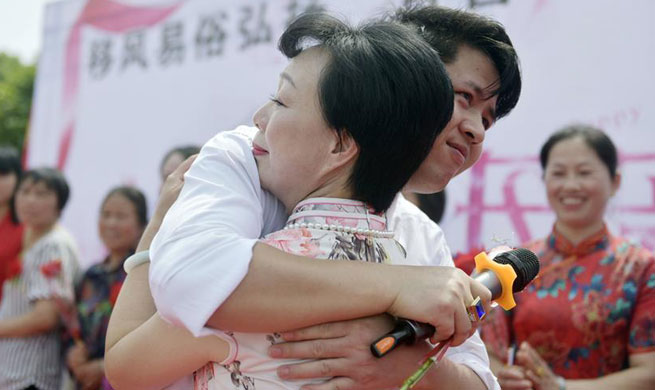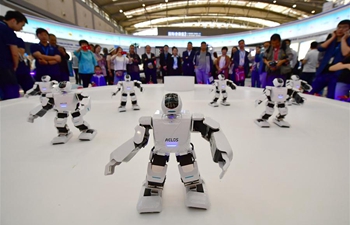YINCHUAN, May 13 (Xinhua) -- Like any stay-at-home mom, Liu Shuqin's day starts with cooking breakfast, waking up her daughters and then sending them to school.
"Let mom help you with the buttons on your shirt," says Liu, 53, to her 7-year-old girl Song Xinying.
Right after that, she starts helping another daughter, 17-year-old Sima Yiding, with her hair. "See how mom combs your hair? Aren't you my pretty girl?" she says.
The girl seems shy and keeps her head down. "Yeah, it looks pretty," she mumbles.
Xinying and Yiding are Liu's two mentally challenged children and they are among the 10 foster children she has raised since 2003.
They were abandoned by their birth parents when they were born. After spending time in an orphanage, they were sent to Liu's home as part of China's efforts to explore new ways of helping disabled orphans.
"They are slower than other kids. The little one still can't use chopsticks after four years of learning," Liu says. "But I see them as my own kids."
Liu already had two children before she became a foster mom. Her own children were already teenagers when she took her first foster child Yiding at the age of three in 2003.
"I never forget the day I saw her," Liu says. "She was wearing a cute little hat and was so adorable."
Liu thought it would not be a problem to care for the children, as she had already raised two. But it was harder than she expected. From teaching Yiding how to use the bathroom to being there with her when she received treatment, Liu never gave up on her. She was her mom, teacher and rehabilitation trainer.
Four years ago, Liu had to stay in bed due to a waist injury. One day, there only she and Yiding were home, and the then-14-year-old girl volunteered to bring her a glass of water. It seems very natural for an ordinary child at the age, but Liu knew only too well how valuable it was for a child like Yiding. She was moved to tears.
"I felt all those years of caring were not in vain. Although Yiding is not good at expressing her thoughts, she knew her mom was too ill to get out of bed and needed care," she says.
Xinying was four years old when she was sent to Liu's home. Liu tried to teach her how to call her "mom" every day. But over a year passed and Xinying still didn't know how to pronounce it. Liu was anxious.
On an autumn morning in 2016, Xinying suddenly opened her mouth and called out "mom" twice.
"I was too excited to say anything, and urged her to call me several more times," Liu says.
The orphanage calculates a birthday for every child based on their health conditions when they were sent in. Yiding's birthday is on May 12.
This Sunday is the last Mother's Day that Yiding will spend with her mother. According to regulations, foster children have to be transfered to a social welfare institute when they turn 18. Yiding needs to leave the home where she spent the last 15 years.
Liu knows that Yiding must go and learn to be independent, but she hates to say goodbye to her daughter.
"I taught her some basic embroidery skills and hopefully she can find a job," Liu says. But she knows that Yiding's future is full of uncertainty.
Liu has spent 15 years raising orphans by herself. "Including my own ones, I'm proud to say that I have 12 children," she says.
In Huifeng Village of Yongning County in northwest China's Ningxia Hui Autonomous Region, 100 disabled orphans are now living with 57 foster families. Over the past 17 years, a total of 328 children have lived in 102 households.
Yang Jinkai, 27, was lucky to spend his childhood in a foster home there. He now has a job and interacts with society comfortably.
"In addition to material satisfaction, I found psychological comfort from my foster parents and siblings. Without them, I would have become a kid without parents," Yang says.
Du Yong, head of the Ningxia children's welfare home, says that compared with children who are raised in a welfare institution, children from foster families are emotionally healthier. The parent-child relationship and family life are valuable throughout their whole lives.
"As people like us, orphans have the desire and are entitled to live with a family and feel the warmth extended by people around them. They have been abandoned once. Society cannot let them be abandoned again," says Wang Jin, director of the welfare home's family foster-care center.

















